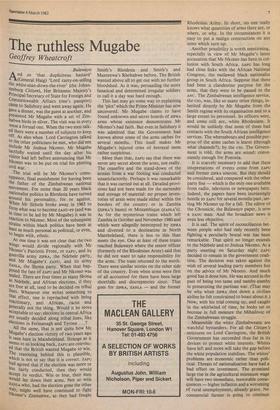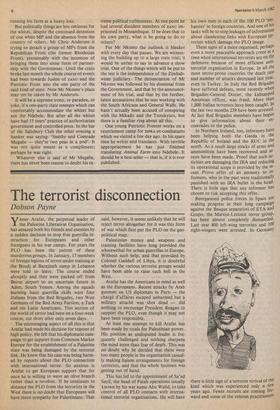The ruthless Mugabe
Geoffrey Wheatcroft
And so 'that duplicitous bastard' (General Haig) 'Lord carry-on-selling the white-man-down-the-river' (the Johan- nesburg Citizen), Her Britannic Majesty's Principal Secretary of State for Foreign and Commonwealth Affairs (one's passport) Caine to Salisbury and went away again. He gave a dinner, was the guest at another, and presented Mr Mugabe with a set of Zim- babwe birds in silver. The visit was in every sense a formal one. When the two men talk- ed there were a number of subjects to keep off. As also when Lord Carrington talked to the other politicians he met, who did not Include Mr Joshua Nkomo. Mr Mugabe tactfully waited until the day after his visitor had left before announcing that Mr Nkomo was to be put on trial for plotting civil war.
The trial will be Mr Nkomo's come- uPPance, final punishment for having been the father of the Zimbabwean national movement. For more than 20 years black nationalist politics in Rhodesia have turned around his personality, for or against. When Mr Sithole broke away in 1963 to form what was to become ZANU-PE (and was in time to be led by Mr Mugabe) it was in reaction to Nkomo. Most of the subsequent strains within black politics have been at least as much personal as political, or even, to begin with, ethnic. At one time it was not clear that the two Wings would divide regionally with Mr Nkomo's Patriotic Front, or ZAPU, and its guerrilla army ZIPRA, the Ndebele party, and Mr Mugabe's ZANU, and its army ZANLA, the Shona party. When that hap- pened the fate of ZAPU and Mr Nkomo was sealed. There are four times as many Shona as Ndebele, and African elections, if they are free at all, tend to be decided on tribal hues. Whenever one writes something to that effect, one is reproached with being reactionary, anti African, racist and generally not the thing. Would it be more acceptable to say: elections in central Africa are usually decided along tribal lines, like elections in Fermanagh and Tyrone .. • ? All the same, that is not quite how Mr Mugabe's election victory of two years ago is seen here in Matabeleland. Strange as it seems to us looking back, ZAPU are convinc- ed that the British wanted Mugabe to win. The reasoning behind this is plausible, which is not to say that it is correct. ZAPU had agreed that if the election was more or less fairly conducted, then they would accept its verdict. Win or lose, their men Would lay down their arms. Not so with ZANLA who, had the election gone the other Way, might well have continued to fight Nkomo's Zimbabwe, as they had fought
Smith's Rhodesia and Smith's and Muzorewa's Rhobabwe before. The British wanted above all to get out with no further bloodshed. As it was, persuading the more fanatical and determined irregular soldiers to call it a day was hard enough.
This last may go some way to explaining the 'plot' which the Prime Minister has now uncovered. Mr Mugabe claims to have found unknown and secret hoards of ZIPRA arms whose existence demonstrates Mr Nkomo's bad faith. But even in Salisbury it was admitted that the Government had known about some of the arms caches for several months. This itself makes Mr Mugabe's injured cries of betrayal seem rather suspicious.
More than that, ZAPU say that there was never any secret about the arms, not really. The ceasefire and the stand-down of the armies from a war footing was conducted unsatisfactorily. Perhaps it was remarkable that it was carried out at all. Detailed provi- sions had not been made for the surrender and storage of material: no proper inven- tories of arms were made either within the borders of the country or in Zambia (ZIPRA'S bases) or Mozambique (zAisnA's). As for the mysterious trains which left Zambia in October and November 1980 and which were allegedly intercepted by ZIPRA and diverted to a destination in North Matebeleland, there is less to this than meets the eye. One at least of these trains reached Bulawayo where the senior officer (formerly of the Rhodesian Army) said that he did not want to take responsibility for the arms. The train returned to the north. There were similar stories on the other side of the country. Even when arms were first of all accounted for there have been large shortfalls and discrepancies since. That goes for ZIPRA, ZANLA - and the former
Rhodesian Army. In short, no one really knows what quantities of arms there are, or where, or why. In the circumstances it is easy to put a malign construction on any arms which turn up.
Another possibility is worth mentioning, especially in view of Mr Mugabe's latest accusation that Mr Nkomo has been in col- lusion with South Africa. ZAPU has long had close links with the African National Congress, the outlawed black nationalist group in South Africa. Suppose that there had been a clandestine purpose for the arms, that they were to be passed to the ANC. The Zimbabwean intelligence service, the cm, was, like so many other things, in- herited directly by Mr Mugabe from the Smith regime with its organisation and to a large extent its personnel. Its officers were, and some still are, white Rhodesians. It would be unlikely that none of them had contacts with the South African intelligence services. The whereabouts and possible pur- pose of the arms caches is learnt (through what channels?), by the cio. The Govern- ment is told, the arms are seized: conve- niently enough for Pretoria.
It is scarcely necessary to add that these intepretations of events come from ZAPU and former ZIPRA sources. But they should be considered, and compared with the other party line — which is the only one available from radio, television or newspapers here. Indeed, the papers have been increasingly hostile to zAipu for several months past, set- ting Mr Nkomo up for a fall. The editor of the Chronicle, the Bulawayo paper, is now a ZANU man. And the broadcast news is even less objective.
It is sad. The spirit of reconciliation bet- ween people who had only recently been fighting a peculiarly brutal war has been remarkable. That spirit no longer extends to the Ndebele and to Joshua Nkomo. At a party meeting on Saturday night ZAPU decided to remain in the government coali- tion. The decision was taken against the wish of several leading party members but on the advice of Mr Nkomo. And much good has it done him. He was accused in the past of being too tame and namby-pamby in prosecuting the partisan war. (That may be why when ZIPRA shot down a civilian airline he felt constrained to boast about it.) Now, with his trial coming up, and caught in the whirlwind of time, he looks set to become in full measure the Mihailovic of the Zimbabwean struggle.
Meanwhile the white Zimbabweans are watchful bystanders. For all the Citizen's strictures on Lord Carrington, the British Government has succeeded thus far in its devices to protect white interests. Whites have left and more will take the gap before the white population stabilises. The whites'
problems are economic rather than poli- tical. Threats of nationalisation have had a bad effect on investment. The promised large rise in the agricultural minimum wage will have two immediate, inexorable conse- quences — higher inflation and a worsening of rural unemployment, already grave. No commercial farmer is going to continue running his farm at a heavy loss.
But politically things are less ominous for the whites, despite the continued detention of one white MP and the absence from the country of others. Mr Chris Andersen is trying to detach a group of MPs from the Republican Front (the former Rhodesian Front), presumably with the intention of bringing them into some form of partner- ship with the Government. Until the crisis broke last month the whole course of events had been towards fusion of ZANU and the Patriotic Front into the one party of the said kind of state. Now Mr Nkomo's place may yet be taken by Mr Andersen.
It will be a supreme irony, or paradox, or joke, if a one-party state emerges which can comfortably accommodate the whites but not the Ndebele. But after all the whites have had 15 years' practice of authoritarian government and controlled press. In the bar of the Salisbury Club the other evening a banker was saying: 'Smithy and Comrade Mugabe — they're two peas in a pod'. It was not quite meant as a compliment; perhaps he was right.
Whatever else is said of Mr Mugabe, there has never been reason to doubt his ex-
treme political ruthlessness. At one point he had several dissident members of ZANU im- prisoned in Mozambique. If he does that to his own party, what is he going to do to others?
For Mr Nkomo the outlook is bleaker with every day that passes. We are witness- ing the building up to a large state trial; it would be unfair to say in advance a show trial. One of the things which will be put to the test is the independence of the Zimbab- wean judiciary. The denunciation of Mr Nkomo was followed by his dismissal from the Government, and that by the announce- ment of his trial, and that by the further, latest accusations that he was working with the South Africans and General Walls. He hasn't actually been accused of conspiring with the Mikado and the Trotskyists, but there is a familiar ring about all this.
One young Patriotic Fronter works on a resettlement camp for ZIPRA ex-combatants which we visited a few day ago. In his spare time he writes and translates. With terrible appropriateness he has just finished translating Animal Farm into Ndebele. It should be a best-seller — that is, if it is ever published.







































 Previous page
Previous page